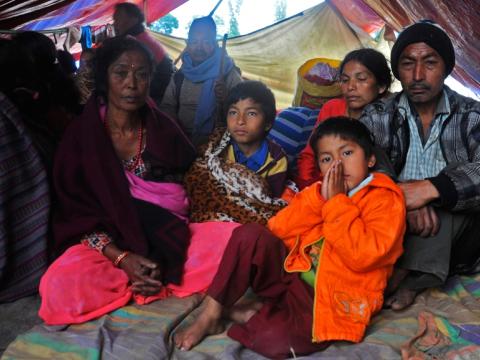When losing your house means losing everything

Kaanchi and her husband are very worried about their sons.
For the past four days, their family has slept under a make shift tent, shared with other famililes. The patchwork of tarpaulins include one provided by World Vision.
Their house was reduced to rubble by the earthquake and they could not save or retrieve any of their belongings.
“We don’t even have a change of clothes. And whatever the other people in our tent give us, we eat that,” says Kaanchi.
“Since the earthquake I haven’t been able to find any work. I don’t know how I’m going to take care of my family."
A day or two after the earthquake, a couple approached Kaanchi, and asked if they could adopt their boys Aaram Sai, 7, and Sri Krishna, 11, and take care of them.
“I didn’t know who they were and why they wanted to take care of my sons. I said no, I don’t want to live separate from my sons,” says Kaanchi.
The loss of their house has placed thousands of children like Aaram and Sri Krishna at risk of being left unprotected and vulnerable to various dangers.
Nepal has long been plagued by issues of child abduction, false orphanages, illegal international adoptions and child trafficking. The loss of their house has placed thousands of children like Aaram and Sri Krishna at risk of being left unprotected and vulnerable to various dangers.
“I don’t know if the couple approached any more families here,” adds Kaanchi.
Little Aaram Sai, recalls the earthquake, “I was playing outside and suddenly I saw everyone running and buildings falling down. I was so scared and my mother came and picked me up,” he says.
Aaram Sai’s father is a daily wage labourer, earning around Rs.300 (about USD $5) a day.
“Since the earthquake I haven’t been able to find any work,” he said. It has been four days now. “I don’t know what to do. And I don’t know how I’m going to take care of my family,” he added.
Every night, more than 40 people sleep under this one tent. Not all of them have lost their houses. Some are just sleeping outside their houses out of fear.
However, homelessness and having to sleep outside in open spaces makes children vulnerable.
It is estimated that the earthquake has left over one million people homeless. World Vision has distributed more than 1000 tarpaulins as an immediate response and has dispatched a shipment of 5,000 more.
World Vision has set-up six Child Friendly Spaces, to ensure the safety and protection of children and assist with emotional support.
Arpanah Rongong, Child Protection Specialist at World Vision Nepal, said: “There are immediate emotional needs as well as practical ones. Many children lost everything they knew when the earthquake struck. It claimed lives of parents and friends, and reduced homes and schools to rubble.
“Child Friendly Spaces are protected places for children to start coming to terms with this loss, giving them a bit of calm amid the chaos. Young people often start expressing their emotions through artwork, which helps them start to make sense of the devastation around them.”